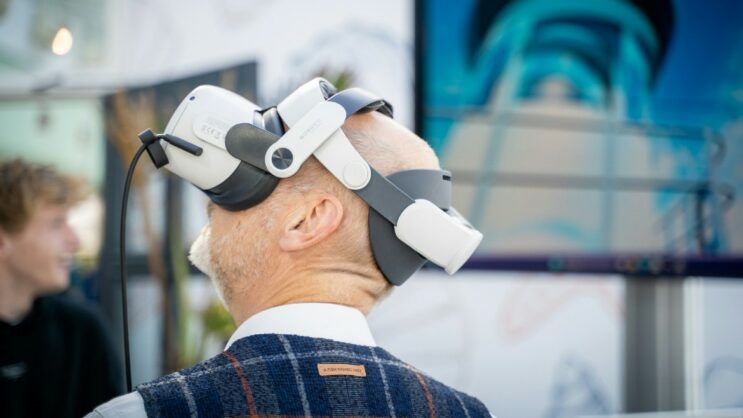Revolutionary Spine Support Tech Passes Mayo Clinic's Rigorous Testing
Manufacturing
2025-04-24 13:10:00Content

Composite Manufacturing Inc. Unveils Groundbreaking NekSpine™ Wearable Support System Following Comprehensive Mayo Clinic Study
In a significant milestone for ergonomic medical technology, Composite Manufacturing Inc. has announced the successful completion of an extensive year-long clinical research study at the prestigious Mayo Clinic, validating the remarkable performance of their innovative NekSpine™ wearable support system.
The NekSpine™ represents a revolutionary approach to addressing musculoskeletal challenges in medical environments, offering healthcare professionals a cutting-edge solution designed to enhance comfort, mitigate physical strain, and safeguard long-term professional well-being. By providing targeted spinal support during complex and physically demanding medical procedures, the device promises to transform workplace ergonomics and reduce the risk of occupational fatigue.
This comprehensive clinical investigation underscores the NekSpine™'s potential to significantly improve healthcare professionals' physical resilience and operational efficiency, marking a pivotal advancement in occupational health technology.
Revolutionary Spinal Support Technology Transforms Medical Ergonomics
In the ever-evolving landscape of medical technology, groundbreaking innovations continue to reshape how healthcare professionals approach physical challenges during complex medical procedures. The intersection of ergonomic design and medical engineering has yielded remarkable solutions that prioritize both practitioner well-being and patient care.Pioneering Comfort: A Breakthrough in Medical Workplace Wellness
The Ergonomic Challenge in Modern Medical Practice
Medical professionals routinely encounter significant physical strain during intricate procedures. Surgeons, radiologists, and specialized technicians frequently maintain challenging postures for extended periods, which can lead to substantial musculoskeletal stress. Traditional support mechanisms have proven inadequate in addressing the nuanced physical demands of contemporary medical environments. The human body was not designed to withstand prolonged static positioning, especially in high-precision medical settings. Extended periods of immobility can trigger cascading physiological responses, including muscle fatigue, reduced circulation, and potential long-term structural damage to the spine and surrounding musculature.Innovative Engineering: Reimagining Spinal Support Systems
Advanced biomechanical research has illuminated critical insights into human movement and structural support. By integrating sophisticated materials science with comprehensive understanding of human anatomy, engineers have developed next-generation support technologies that dynamically adapt to practitioners' physiological needs. These cutting-edge systems leverage principles of distributed weight management, utilizing lightweight yet robust materials that provide targeted support without restricting natural movement. Sophisticated sensor technologies enable real-time biomechanical analysis, allowing for unprecedented customization and adaptive response.Clinical Validation and Performance Metrics
Rigorous scientific evaluation represents the cornerstone of medical technology validation. Comprehensive studies conducted at premier research institutions provide empirical evidence of technological efficacy. Detailed biomechanical assessments track multiple performance indicators, including muscular engagement, fatigue reduction, and long-term physiological impact. Quantitative measurements reveal significant improvements in practitioner comfort and sustained performance. Participants reported substantial reductions in physical strain, with objective metrics demonstrating enhanced endurance and decreased muscular compensation patterns during complex medical procedures.Technological Architecture and Design Philosophy
The underlying design philosophy transcends traditional orthopedic support mechanisms. By integrating advanced materials like high-performance polymers and adaptive composite structures, engineers have created a holistic solution that responds dynamically to individual physiological requirements. Precision-engineered components distribute mechanical stress across multiple contact points, minimizing localized pressure and promoting optimal spinal alignment. Breathable, lightweight materials ensure maximum comfort while maintaining structural integrity under demanding professional environments.Future Implications for Medical Professional Health
This technological breakthrough represents more than an incremental improvement—it signifies a paradigm shift in understanding occupational health within medical contexts. By proactively addressing practitioner physical well-being, healthcare institutions can potentially reduce long-term injury risks and enhance overall professional sustainability. Emerging research suggests that such ergonomic innovations could significantly mitigate career-related musculoskeletal disorders, which currently represent a substantial economic and human capital challenge in healthcare systems worldwide.RELATED NEWS
Manufacturing

Manufacturing Mirage: How Trump's Economic Promise Crumbles Under Scrutiny
2025-05-06 09:00:50
Manufacturing

Breakthrough Weight-Loss Drug: Lilly Accelerates US Production After Landmark Clinical Success
2025-04-21 12:51:48






